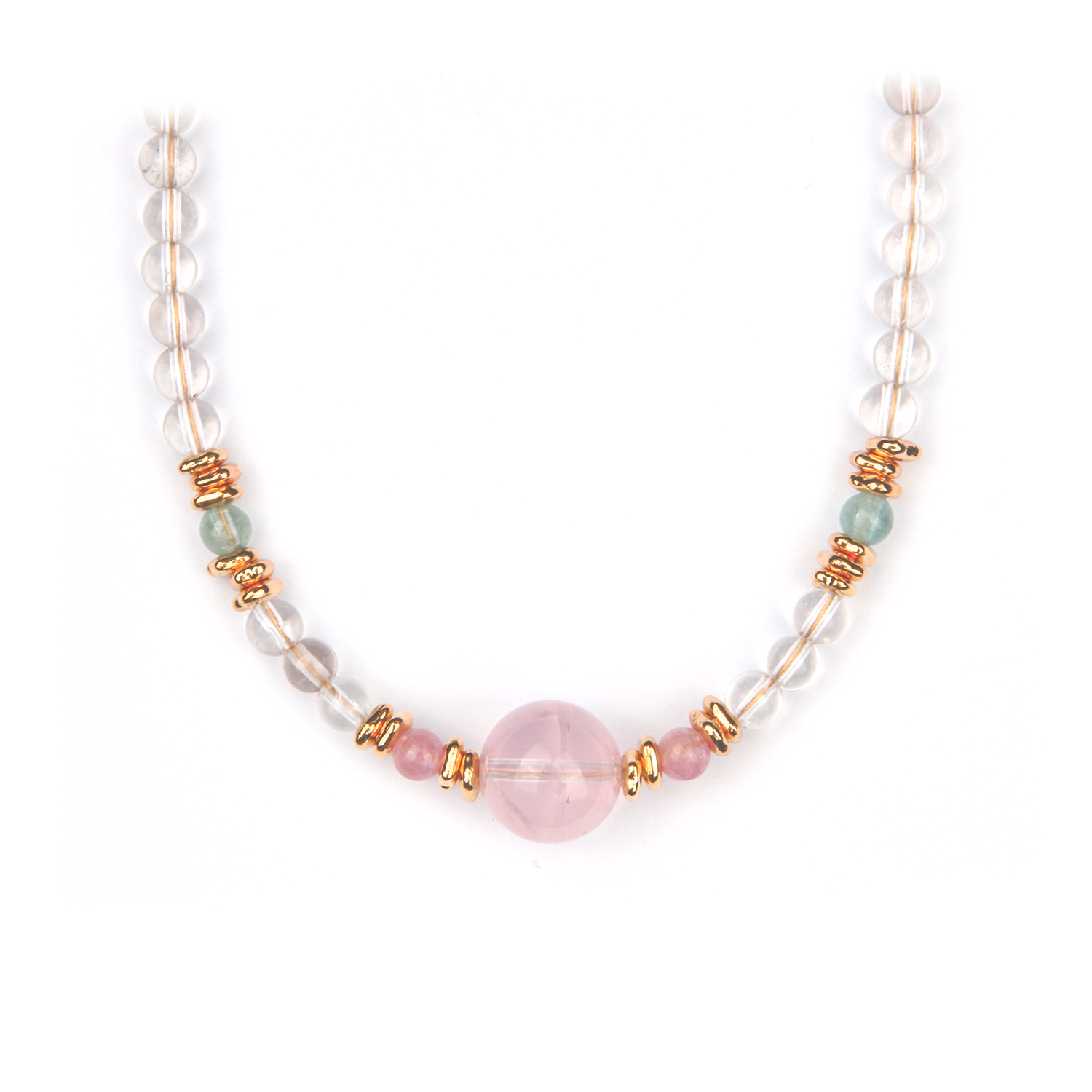Morganite
The Gemstone of Love and Elegance
Morganite, with its soft pink to peach hues, is a gemstone that exudes romance, femininity, and sophistication. As a member of the beryl family—the same mineral group as emerald and aquamarine—morganite has become a sought-after choice for engagement rings and fine jewelry.
In this guide, we’ll explore morganite’s origins, formation, symbolism, value, styling tips, gemstone pairings, color inspirations, and more.
Origin of Morganite
Morganite is primarily sourced from pegmatite deposits in various parts of the world. The most notable sources include:
-
Brazil – Produces some of the highest-quality morganite, with rich peach and pink hues.
-
Madagascar – The first place where morganite was discovered; known for vibrant pink crystals.
-
Afghanistan & Pakistan – Yield delicate pastel-pink specimens.
-
Mozambique & Namibia – Provide peachy-toned morganite with exceptional clarity.
-
USA (California & Maine) – Mined in smaller quantities, often in lighter pink shades.
Brazil remains the top supplier of commercial-grade morganite, while Madagascar’s stones are the most prized for their strong pink color.
Formation Process of Morganite
Morganite is a variety of beryl that gets its pink-to-peach color from trace amounts of manganese.
Formation Process:
-
Pegmatite magma cools slowly, allowing large beryl crystals to form.
-
Manganese ions replace some aluminum atoms, giving morganite its signature blush tones.
-
Hydrothermal activity enhances crystal growth, sometimes leading to rare cat’s eye morganite (chatoyancy).
Morganite’s soft hues and exceptional clarity make it one of the most delicate yet durable gemstones for jewelry.
Cultural Significance and Meaning of Morganite
Morganite is often associated with love, harmony, and emotional healing.
-
Named in Honor of J.P. Morgan – This gemstone was named after the American financier and gem collector by Tiffany & Co. in 1911.
-
The Stone of Divine Love – Believed to open the heart chakra, promoting compassion and deep emotional connections.
-
Symbol of Romance – Increasingly popular in engagement rings due to its soft, feminine hues and timeless appeal.
-
Stress Reliever – Thought to help reduce anxiety and encourage inner peace.
Morganite’s warm and soothing energy makes it a gemstone that symbolizes eternal love and emotional balance.
Market Value and Rarity
Morganite is considered a semi-precious gemstone, but its popularity has risen significantly, especially in the bridal jewelry market.
-
Price Range: Typically $100 to $500 per carat, with top-quality pieces reaching $1,000+ per carat.
-
Most Valuable Morganite:
-
Deep pink hues (more rare than peach tones).
-
High clarity with minimal inclusions.
-
Well-cut stones that maximize brilliance.
-
-
Larger Stones: Morganite is often found in larger sizes (5+ carats) at relatively affordable prices compared to diamonds.
Due to its romantic color, durability (Mohs 7.5-8), and affordability, morganite remains highly desirable for engagement rings and fine jewelry.
Morganite Properties
External
Career & Success
Career Success
Relationships & Communication
Harmony & Unity
Inner
Composure
Calmness
Harmony
Excellence
Initiation
Zodiac

Element

Chakras

Planet


Mohs Hardness
7.5 - 8
Click to copy the Morganite properties
Jewelry Uses and Fashion Tips
Morganite’s pastel pink tones pair beautifully with both classic and modern jewelry styles.
Best Jewelry Styles:
-
Engagement Rings – A unique alternative to diamonds, offering a romantic, soft glow.
-
Halo Earrings – Small morganites surrounded by diamonds create a timeless look.
-
Rose Gold Necklaces – Enhances morganite’s warm undertones.
-
Stackable Bracelets – Layering with other soft-hued gems adds elegance.
Fashion Styling Tips:
-
Romantic & Feminine – Pair with soft pastels (blush, lavender, ivory) for a dreamy, romantic look.
-
Modern Chic – Wear with monochrome outfits (black, white, or gray) for a sophisticated contrast.
-
Bohemian Luxe – Combine with flowy fabrics, lace, or floral prints for a free-spirited feel.
Morganite’s versatile elegance makes it an ideal gemstone for both everyday wear and special occasions.
Pairing Morganite with Other Gemstones or Materials
Complementary Gemstones:
| Gemstone | Why It Pairs Well with Morganite |
|---|---|
| Diamond | Enhances morganite’s brilliance and makes it perfect for engagement rings. |
| Rose Quartz | Creates a soft, romantic energy with its similar pink hues. |
| Moonstone | Adds an ethereal, dreamy glow that enhances morganite’s delicacy. |
| Pearls | Elevates elegance and complements morganite’s soft blush tones. |
| Aquamarine | Provides a refreshing blue-pink contrast, creating a soft yet vibrant aesthetic. |





Best Metal & Material Pairings:
-
White Gold – Adds a cool contrast, making the pink hue appear more vibrant.
-
Yellow Gold – Warms up lighter morganite tones, giving a vintage-inspired look.


These pairings elevate morganite’s natural beauty, making it a versatile gemstone for jewelry lovers.
Crystal Color Palettes for Artistic and Fashion Inspiration
Morganite’s delicate hues inspire fashion, art, and interior design. Here are five color palettes inspired by this captivating gemstone:

- #F4C6C3 Blush Pink – Represents morganite’s signature soft pink shade.
- #E9A499 Peach Rose – A warmer variation of morganite’s tones.
- #E6B87D Champagne Gold – Complements its soft shimmer, ideal for rose gold pairings.
- #F8F1ED Cloud White – Enhances its pastel elegance, perfect for minimalist designs.
- #A6D4E3 Ocean Blue – A refreshing contrast to morganite’s warmth, inspired by its aquamarine sibling.
These colors can be used in fashion styling, home décor, and artistic compositions.
Morganite is often called the Stone of Divine Love, making it a symbol of commitment and emotional harmony. If you could design a custom jewelry piece featuring morganite, what would it be—a vintage-style engagement ring, a boho-inspired pendant, or something else?
Let’s discuss in the comments!







Share:
Malachite Gemstone Guide: Properties, Rarity, Pricing, Jewelry Uses & Stylish Tips
Lepidolite Gemstone Guide: Properties, Rarity, Pricing, Jewelry Uses & Stylish Tips